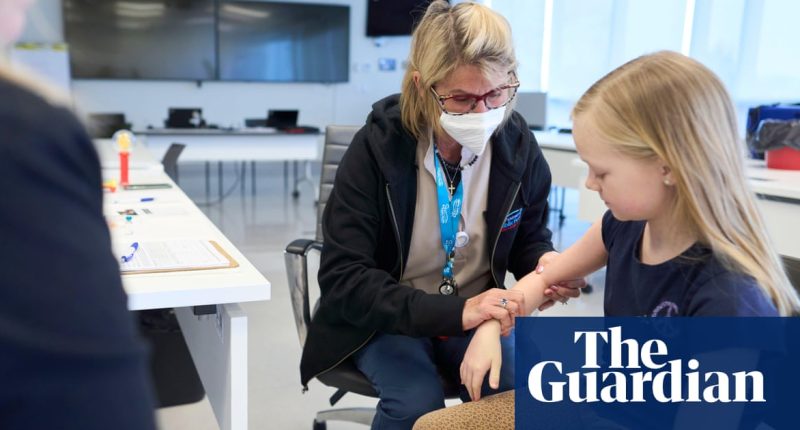Share this @internewscast.com
Outside the emergency room of the St Thomas Elgin general hospital, about 200km (125 miles) south-west of Toronto, a large sign with bright yellow block letters issues an urgent warning: “NO MEASLES VAX & FEVER COUGH RASH – STOP – DO NOT ENTER!”
To see such an imperative in the 21st century might have been previously unimaginable for Canada, which in 1998 achieved “elimination status” for measles, meaning the virus is no longer circulating regularly.
Now, however, Canada is at risk of losing that status – mainly because of an explosive outbreak of the highly infectious and sometimes deadly disease in south-western Ontario, where the St Thomas hospital is located.
Since October, the province has reported a staggering 2,009 cases of measles associated with the current outbreak – more than all of those in the United States combined in 2025, and making Ontario the measles epicentre of the western hemisphere.
Cases have been climbing by the hundreds over the last month, and three-quarters of cases are in unvaccinated children, according to Public Health Ontario.
This week saw the first fatality from the outbreak: a premature baby who contracted measles in utero from their unvaccinated mother. Ontario’s chief medical officer of health, Kieran Moore, said that the infant faced other unrelated medical complications, but confirmed that measles may have been a contributing factor in both the premature birth and death.
“We have not had a measles outbreak in the community, of this size, for as long as I have practiced. Lots of doctors have never seen measles before now,” said Asmaa Hussain, a doctor who is head of paediatrics at the St Thomas Elgin general.
Hussain said that the true scale of the outbreak may be even larger.
“There are likely lots and lots of children and families at home who had measles, who never presented to the hospital,” she said. “The tested cases do not capture even a fracture of what has happened in the community.”
Nearly 40% of cases in Ontario have been reported by the Southwestern Public Health Unit, which services Oxford county, Elgin county and the city of St Thomas, all about a two-hour drive south-west of Toronto.
Shocking though the scale of the outbreak may seem, doctors on the frontline and scientists who study public health say that the return of measles was grimly predictable.
A confluence of antiquated local public health vaccination strategies, sparse access to family doctors, delays in routine immunization due to Covid-19 and a surge in vaccine hesitancy propelled by online misinformation since the pandemic all have contributed to the crisis.
South-western Ontario is also home to populations of close-knit vaccine-hesitant religious communities who are less exposed to public health messaging, such as Mennonites. The current outbreak has been traced to a Mennonite wedding in New Brunswick, from which a guest returned to Ontario with the virus.
Meanwhile, case numbers have also been creeping up in the western province of Alberta, which this week reported a total of 710 confirmed cases, making it the worst year for measles since 1986, when 843 cases were reported.
Measles is characterized by fever, cough, and a blotchy red, purple or brown widespread rash, and it can result in brain damage, blindness and death in severe cases. It is highly preventable through vaccination, however, and Canada’s goal is for 95% of the population to be immunized against the disease to prevent community spread.
But the country has dropped below that as first-dose coverage for measles nationally fell from 2019 to 2023, from 90% to 83%, according to the Public Health Agency of Canada.
In St Thomas, Hussain said that this year she has treated many babies younger than 12 months old with measles. Babies under a year are not eligible for the measles vaccine, and Hussain said that in many cases they are infected by unvaccinated older siblings who have picked up the virus from school.
Hussain also said she had treated an unvaccinated woman who caught the disease from her children before transmitting it to her newborn baby after delivery.
It is illegal to send an unvaccinated child to school in Ontario unless they are immunized against various illnesses, including measles. But, exemptions are possible for valid medical reasons and when vaccination goes against personal religious belief.
Also, when unvaccinated families present with measles at healthcare centres, doctors sometimes struggle to even discuss vaccination with the parents, Hussain said.
“It’s really hard to even approach the conversation. I would ask: ‘How come you aren’t [vaccinated]?’ And they will say: ‘Oh, we’re exempt’ or ‘We’ve had this discussion before and we just don’t want to,’” she said.
Dawn Bowdish, an immunologist and professor at McMaster University in Ontario, said while distrust of vaccines has increased, Canada’s family doctor crisis also precipitated the measles outbreak.
About 20% of Canadians have no family doctor at all, and many more have irregular access to clinicians, so parents do not have easy access to a trusted healthcare professional to discussion vaccinations. Furthermore, the lack of a national vaccine registry means that it can be challenging to know your own vaccination status, she said.
Bowdish also warned that vaccine exemptions were too easily obtained.
“One of the challenges is that there’s been a loosening of exemptions as well, so people may not have that faith-based reason, or a reason that’s actually supported by their religion, but just a general sense that they don’t get their kids vaccinated. It’s really hard to balance personal freedoms with public health,” she said.
Ontario’s Ministry of Health did not respond to a query about vaccine exemptions and strategies to reach religious minority communities. The Southwestern Public Health Unit referred queries to Public Health Ontario, who in turn referred the question to the Southwestern Public Health Unit.
Various vaccine clinics have been launched across south-western Ontario to ramp up the measles immunization status in the region, though they have not been held at schools. The Ontario government has previously said its teams are on the ground with local public health units, but that convincing vaccine-hesitant people is difficult.
Kumanan Wilson, a doctor and professor at the University of Ottawa who studies public health policy, said the Covid pandemic heightened anxieties about perceived government overreach – and simultaneously resulted in many people losing direct, frequent access to medical care.
But, he said, focusing on religious communities in the current outbreak could obscure broader concerns that previous methods used by public health agencies to manage illness have lost efficacy.
“They’re going to have to learn to navigate this new world of people not trusting government as much and more populist tendencies. And that’s going to take an adjustment in how we communicate,” he said.
Twenty years ago, Wilson carried out a study that found providing accurate public health information actually increased mistrust among the vaccine-hesitant, who said they found it “manipulative”.
“You need to find champions within those communities, who believe in what the public health people are telling them, and can communicate that message,” he said. He said Canadian public health has previously focused on shaming those who do not vaccinate.
“And in this era, that doesn’t work,” he said.
A study by the Angus Reid Institute published at the end of May found that a quarter of Canadians overall do not trust their provincial governments to respond to the measles outbreak adequately. That number was higher in Ontario, at 27%.
That study also found that one in five Canadians with children under 18 are hesitant to vaccinate their children.
Hussain fears that other previously dormant illnesses may return.
Measles, when mild, can be managed by physicians like herself. But an illness like polio could result in more dire consequences, including higher rates of death, she said.
“My worry is about the next outbreak. Because there will be a next one coming, right?” she said.












